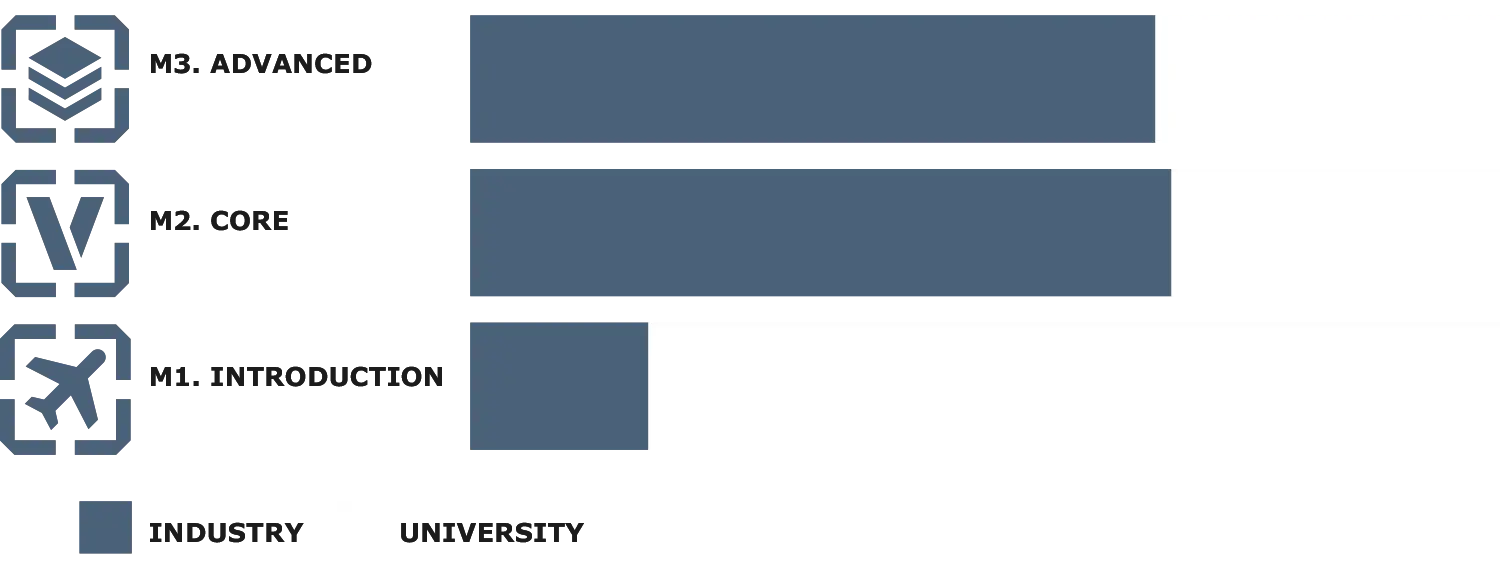MASI
The Master´s in Aircraft Systems Integration (MASI), sponsored by Airbus-Spain, has been specifically designed for recent graduate engineers, and working professionals who want to develop and lead projects of Systems Integration.
Our courses are given in English by internationally recognized experts in their fields coming from the key players in the aeronautical business, including industry, academia, government and regulators.
MASI25 classes will start on September 1st 2025


PROGRAM
The MASI program comprises of 90 credits, including an industry-oriented Master’s Final Project. Its modular structure allows for part-time study with a flexible completion date taking between 1.5 and 3 years.
The MASI Program combines three basic elements.
- Fundamentals (M1), to provide the basis, the support to understand the technologies, the methods, the requirement.
- Generalization (M2), required to manage complexity and to understand the whole (systems thinking), and
- Experimentation (M3), to move from abstraction to implementation, innovation, invention.

M1. Introductory Level (16.6 credits).
Courses in the Introductory Level provide the essential technical knowledge required to understand the operation and function of the various aircraft systems.
Introduction to Aircraft Systems Integration (2.4 credits)
Fundamentals of Aeronautical Engineering (6.0 credits)
Onboard Electronics and Instrumentation (3.2 credits)
Aeronautical Communications (3.0 credits)
Introduction to Aircraft Control (2.0 credits)

M2. Core Level (14.8 credits).
The Core Level establishes the global systemic vision required to manage large, complex aeronautical projects. The focus is on the transversal procedures, methodologies, tools, and key stakeholders common across all systems integration projects. Coursework includes foundational topics like Systems Engineering and Project Management, alongside specialized subjects specific to the aeronautical context that are critical for integration processes.
Systems Engineering (3.2 credits)
Airborne Software and Hardware (3.0 credits)
Aircraft Certification and Safety Analysis (3.0 credits)
Aeronautical Projects Management (1.6 credits)
Design and Configuration Management of Aircraft Systems (1.6 credits)
Aircraft Electromagnetic Compatibility (2.0 credits)
Data Engineering for the Digital Aircraft (0.4 credits)

M3. Advanced Level (18.4 credits).
This module focuses on the integration of specific aircraft systems (e.g., Fuel, Hydraulic, Electric, and Avionic Systems). The objective is to apply the general methods and common integration tools learned in the curriculum to individual aircraft systems, subsystems, and components.
Antennas Integration (1.4 credits)
General Systems (5.0 credits)
Communication Systems (2.0 credits)
Surveillance, Identification and Mission Systems (2.6 credits)
Air Navigation Systems (2.2 credits)
Presentation and Flight Information Systems (2.0 credits)
Weapons and Electronic Warfare System (1.6 credits)
Unmanned Air Systems (1.6 credits)

M4. Practical Work (28.2 credits).
This module is designed to provide the students with the technical, professional and social skills needed to enter and/or develop an engineering career in the (aeronautical) systems engineering-related industry.
- Group Design Project (4 credits)
This module offers intensive group work structured as a realistic simulation of a systems integration project. Students organize themselves to mirror the functional engineering departments of an aerospace company, defining roles and responsibilities to develop and implement a comprehensive technical solution.
The goal is to foster both innovation and integration within the broader engineering context. Students actively collaborate with the client to provide a robust technological response to their needs, offering a high-fidelity simulation of professional challenges. This results-oriented approach is fundamental to improving essential interpersonal skills and advanced problem-solving capabilities.
- Internship Placement (20 credits)
The MASI program requires students to complete a period of industrial placement focused on solving real integration problems under the supervision of a Company Tutor. This experience is essential for bridging the gap between theoretical knowledge and professional practice. - Seminars/Conferences/Labs (4.2 credits)

M5. Master’s Final Project (12 credits).
The Final Project consists of developing a complete systems integration project under the supervision of an industry or academic advisor. The project requires the student to demonstrate the systematic application of the methods, tools, and best practices learned throughout the MASI curriculum. The MFP culminates in a written project report and a formal oral defense.

METHOD
The MASI METHOD is more or less the same, regardless of the level at which it is applied. The chaos perceived at low echelons of system development turns into order at high levels.
Arthur David Hall, III, (1998)
Fractal Architecture of the Systems Engineering Method
IEEE Transactions on Systems, Man and CyberneticsOur
Our learning cycle is based on three basic elements:
Fundamentals:
Base to understand the technologies, methods, requirements, …
Generalization: thinking
Systems Thinking <-> Thinking holistically
Avoid complexity through abstraction
Emphasis on the common patterns
Experimentation: doing
Move from abstraction to implementation, innovation, invention
Practice-oriented learning


INTERNSHIPS
All students must complete at least 720 hours of curricular industrial experience. This mandatory requirement is essential for the degree.
- For Recent Graduates: The MASI team provides active support in the search for internships or job placements, helping you secure the required position in an aerospace company.
- For Experienced Professionals: If you have current professional experience in the aerospace sector, these hours can be validated and recognized based on your current work activity while running the Master’s classes.
Beyond this essential real-work experience, the industrial placement enables MASI students to build a valuable professional network, which is highly instrumental for securing permanent employment within the company.

FACULTY

SOME FACTS







